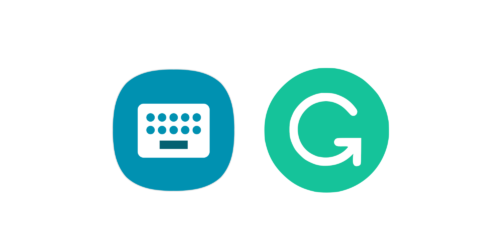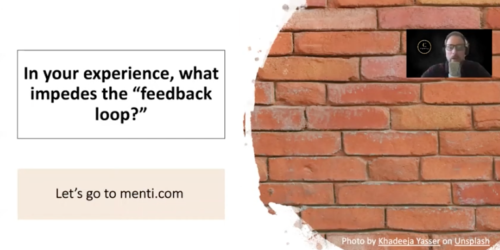
Beyond Assumptions: Leveraging SoTL Research and Quality Improvement Feedback for Evidence of Student Learning

Photo by fauxels
Have you ever found yourself wondering if your students are truly understanding and learning what you’re teaching? While assessments can be reliable indicators of how well students meet course learning outcomes, gauging learning on a class-by-class basis can be tricky. For example, relying on students nodding in agreement or typing “no” in a chat box when asked, “Any questions?” can easily lead us to assume these actions are clear indicators of learning. However, these are not always reliable signs of understanding.
It is understandable that we make these assumptions. Time is a significant factor, especially if we feel the pressure to cover as much content as possible in a class. Pausing to check in and gather student feedback takes up time, but it is a valuable practice. To enhance our teaching and provide effective learning opportunities for as many students as possible, it’s important to move beyond assumptions and gather solid evidence.
We need evidence that captures student experiences, assesses the effectiveness and impact of our teaching strategies, and identifies any gaps in students’ learning processes.
This is where the Scholarship of Teaching and Learning (SoTL) and Quality Improvement (QI) feedback come into play. Both are evidence-based approaches to informing our teaching practices and improving our students’ learning experiences.
Defining SoTL and QI Feedback
SoTL is a framework for research to systematically investigate and improve teaching practices, offering concrete evidence of teaching effectiveness and promoting reflective teaching and improved learning (Vanderbilt University Center for Teaching). SoTL typically involves a process of designing proposals to outline the purposes and processes of our research. It also involves seeking ethics approval, if our work involves human participants.
Example
A semester-long research project aimed at investigating the impact of group work on student learning. This project could use both qualitative and quantitative data collection methods, including student surveys and assignment analysis, to gather evidence on students’ experiences with group work. The results are shared publicly in forms that are appropriate for each teacher (publications, presentations, faculty development opportunities etc.)
QI feedback offers more immediate, actionable insights to address specific teaching and learning challenges. Feedback tools can be used before, during or after class time to garner immediate responses used to improve learning and teaching on a class-by-class basis. QI feedback allows for real-time adjustments, fostering a positive classroom environment and enhancing student engagement (Australian Institute for Teaching and School Leadership). QI often does not require ethics approval, if results are used for internal improvement only.
Example
Creating a survey and sharing it during class to ask students about their preferences for learning, or to suggest improvements to the class. Or conducting a focus group with some students about their experiences of using various learning tools in eConestoga. The results are only used internally to improve teaching strategies and students’ learning experience.
Together, SoTL and QI feedback are complementary inquiry processes that help us understand classroom dynamics and students’ learning experiences, transforming our classrooms into dynamic, responsive learning environments.
Why do SoTL or Collect QI Feedback?
Research indicates that students generally have a positive view on the opportunity to give feedback on teaching and participate in improving their educational experiences. For example, giving feedback can help students to feel empowered and a sense of agency as they appreciate having a voice in their education experiences (Lees, Godbold &Walters, 2023). Similarly, engagement in SoTL research can encourage students to become more reflective, critical, and active learners. This involvement can increase their academic motivation and participation in classes (Less, Godbold & Walters, 2023). As I mentioned in a previous post, SoTL presents possibilities for teachers to explore our classrooms as laboratories for learning, where every challenge is an opportunity for discovery and growth.
Is SoTL or QI right for me?
When deciding whether to engage in a SoTL project or seek feedback for quality improvement, consider some of the differences between the two outlined in the Table below.
| Aspect | SoTL | QI Feedback |
| Scope and Focus | Systematic investigation of teaching practices and their impact on student learning. Aims to contribute to broader education scholarship in and across disciplines. | Practical and immediate focus on solving specific problems or challenges in educational settings. Aims for actionable insights to enhance student experiences. |
| Timeframe | Long-term projects, often span a semester, several semesters or years. Allows for comprehensive data collection and analysis. | Short-term, immediate response to emerging issues or feedback. Focuses on quick adjustments to improve current practices. |
| Stakeholder Involvement | Primarily involves educators conducting research, often in collaboration with other faculty members and sometimes students. | Can involve a broader range of stakeholders, including students, educators, and institutional administrators. Collaborative effort to address identified issues. |
| Outcomes and Impact | Aims to contribute to the body of knowledge on teaching and learning. Can lead to significant pedagogical changes and influence curriculum design. | Targets immediate improvements in teaching practices and student learning experiences. Impact is typically localized to specific courses or programs. |
| Methodologies | Uses theoretical frameworks, extensive literature reviews, and various research methodologies (qualitative, quantitative, mixed methods). | Utilizes targeted surveys, course evaluations, and real-time data collection for practical, actionable feedback. |
| Ethical Considerations | Involves obtaining informed consent, ensuring confidentiality, and adhering to ethical research standards. | Focuses on ethical collection and use of feedback, maintaining student and faculty privacy. |
| Formal Ethics Approval Needed? | Yes – Research Ethics Board approval is required for all research involving human participants. | No- if information is used for internal feedback and improvement only. Yes – If combined with research. |
Guiding Reflection Questions
When deciding on an approach to collect evidence of learning and areas for improvement in your classroom, it can be helpful to reflect on which approach best suits your needs and goals as a teacher. The questions below can help you.
- What are my goals? To make broader contributions to scholarship and improve learning in my classroom? To gain immediate feedback to improve my teaching and students’ learning?
- What do I have time for? (SoTL can be a longer process than QI feedback).
- What specific question or problem do I want to investigate, and why is it important to invest time and energy into it?
- Does the feedback I’m seeking involve other stakeholders? Part of a broader program, school, or institutional quality improvement initiative?
- Do I want to share my results publicly, or am I focused solely on using feedback to improve my course, teaching, and student learning?
- What data collection methods would give me the best evidence of student learning/experiences for research purposes? For QI purposes?
- Does my project involve ethics approvals? If so, do I need support with this process? What other supports might I need for planning and implementing a SoTL or QI project
For any questions and supports or to talk about which inquiry approach may be best for you, consider reaching out to the Centre for Scholarship of Teaching and Learning at Conestoga.






